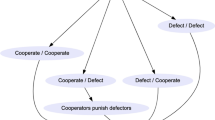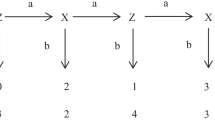Abstract
My aim in this paper is to demonstrate that a very simple learning rule based on imitation can help to sustain altruism as a culturally transmitted pattern or behaviour among agents playing a standard prisoner’s dilemma game. The point of this demonstration is not to prove that imitation is single-handedly responsible for existing levels of altruism (a thesis that is false), nor is the point to show that imitation is an important factor in explanations for the evolution of altruism (a thesis already prominent in the existing literature). The point is to show that imitation contributes to the evolution of altruism in a particular way that is not always fairly represented by evolutionary game theory models. Specifically, the paper uses a simple model to illustrate that cultural transmission includes mechanisms that do not transmit phenotype vertically (i.e. from parent to related offspring) and that these mechanisms can promote altruism in the absence of any direct biological propensity favouring such behaviour. This is a noteworthy result because it shows that evolutionary models can be built to explicitly reflect the contribution of non-vertical transmission in our explanations for the evolution of altruism among humans and other social species.
Similar content being viewed by others
References
R. Axelrod (1984) The Evolution of Cooperation Basic Books New York
K. Binmore L. Samuelson (1997) ArticleTitleMuddling through: noisy equilibrium selection J. Economic Theory 74 235–265 Occurrence Handle10.1006/jeth.1996.2255
J. Bjornmerstedt J. Weibull (1996) Nash equilibrium and evolution by imitation K. Arrow (Eds) et al. The Rational Foundations of Economic Behavior Macmillan New York 155–171
R. Boyd P.J. Richerson (1985) Culture and the Evolutionary Process The University of Chicago Press Chicago
R. Boyd P.J. Richerson (2004) Not By Genes Alone University of Chicago Press Chicago
R. Dawkins (1976) The Selfish Gene Oxford Oxford University Press
D.C. Dennett (1975) ArticleTitleWhy the law of effect will not go away J. Theory Social Behav. 5 179–187
D.C. Dennett (1996) Darwin’s Dangerous Idea Touchstone Press New York
L.A. Dugatkin (2000) The Imitation Factor The Free Press New York
W.H. Durham (1991) Coevolution: Genes, Culture and Human Diversity Stanford University Press Stanford
I. Eshel L. Samuelson A. Shaked (1998) ArticleTitleAltruists, egoists and hooligans in a local interaction model J. Econ. Literature 88 157–179
J. Gale K. Binmore L. Samuelson (1995) ArticleTitleLearning to be imperfect: the ultimatum game Games Econ. Behav. 8 56–90 Occurrence Handle10.1016/S0899-8256(05)80017-X
J. Henrich R. Boyd S. Bowles C. Camerer E. Fehr H. Gintis R. McElreath (2001) ArticleTitleIn search of homo economicus: behavioural experiments in fifteen small-scale societies Am. Econ. Rev. 91 73–78
Kant I. 1991. Idea for a universal history with cosmopolitan purpose. In: Reiss H. (ed.), Kant’s Political Writings. 2nd ed., Cambridge University Press, Cambridge.
P. Kitcher (1993) ArticleTitleThe evolution of human altruism J. Phil. XC 501
P. Kitcher (1999) ArticleTitleGames social animals play: commentary on Brian Skyrms’ evolution of the social contract Phil. Phenomenol. Res. 59 221–228
K. Schlag (1998) ArticleTitleWhy imitateand if so how? A bounded rational approach to the multi-armed bandits J. Econ. Theory 78 130–156 Occurrence Handle10.1006/jeth.1997.2347
B. Skyrms (1996) Evolution of the Social Contract Cambridge University Press Cambridge
Skyrms B. 1999. Precis of evolution of the social contract and reply to critics. Phil. Phenomenol. Res. 59: 217–220and and 243-254.
B. Skyrms (2000) ArticleTitleStability and explanatory significance of some simple evolutionary models Phil. Sci. 67 94–113 Occurrence Handle10.1086/392763
E. Sober D.S. Wilson (1994) ArticleTitleReintroducing group selection to the human behavioral sciences Behav. Brain Sci. 17 585–654
E. Sober D.S. Wilson (1998) Unto Others: the Evolution and Psychology of Unselfish Behavior Harvard University Press Cambridge, Mass
D.S. Wilson L.A. Dugatkin (1997) ArticleTitleGroup selection and assortative interactions Am. Nat. 149 336–351 Occurrence Handle10.1086/285993
S. Woodcock J. Heath (2002) ArticleTitleThe robustness of altruism as an evolutionary strategy Biol. Phil. 17 567–590
Author information
Authors and Affiliations
Corresponding author
Rights and permissions
About this article
Cite this article
Woodcock, S. The Significance of Non-vertical Transmission of Phenotype for the Evolution of Altruism. Biol Philos 21, 213–234 (2006). https://doi.org/10.1007/s10539-005-8241-1
Received:
Accepted:
Issue Date:
DOI: https://doi.org/10.1007/s10539-005-8241-1




